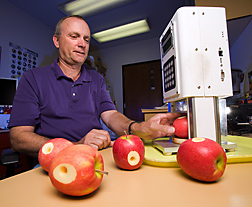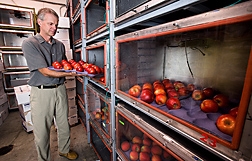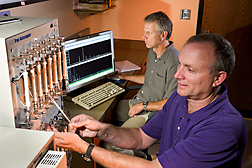Keeping Apples Crunchy and Flavorful After Storage
|
|
Pick an apple off the tree and it’ll last a few weeks before it starts to turn soft and rot. Store an entire harvest under controlled-atmosphere conditions and it’ll last up to 10 months, depending on variety. But the clock starts ticking again once the apples are removed from storage.
To slow the proverbial sands of time, some fruit distributors treat their apple bins with a gaseous compound, 1-methylcyclopropene (1-MCP). It extends the fruits’ poststorage quality by blocking ethylene, a colorless gas that naturally regulates ripening and aging.
“This allows more orderly marketing, without a rush to sell based mainly on loss of firmness,” explains James P. Mattheis, a plantphysiologist who leads the ARS Tree Fruit Research Laboratory in Wenatchee, Washington. “Slower ripening during transport and marketing ultimately results in better quality on the shelf for consumers.”
Mattheis’s experience with 1-MCP dates to the mid-1990s, when he and colleagues were first to show that the gas prevents superficial apple scald, a discoloring peel disorder that is considered a major storage problem. Treating apples with the chemical antioxidant diphenylamine can prevent scald, but the practice can be complicated and requires careful monitoring.
|
|
Available Year ’Round
Apples not intended for fresh market are stored at low temperatures, with low levels of oxygen and high levels of carbon dioxide. While this slows the apples’ natural production of ethylene and its effects, fungicides must often be applied to prevent fungal rots from taking hold. But since its commercial debut in 2002 under the name “SmartFresh,” 1-MCP has in some cases diminished the need for such treatment.
Maine’s 2004 apple crop, for example, saw a 43-percent decrease in fungicide use, thanks to 1-MCP. And on Red Delicious and Granny Smith apples placed in controlled-atmosphere storage, the gas treatment has eliminated the need for diphenylamine to prevent scald.
In Maine and other apple-growing states, including Washington and Michigan, and in 20 foreign countries, use of 1-MCP is an evolving success story that traces its beginnings to discovery and later patenting of the compound (in 1996) by North Carolina State University (NCSU) researchers Edward Sisler and Sylvia Blankenship.
Birth of the Concept
“We were interested in the ethylene-binding sites and wanted to find a chemical tag to help us keep track of the sites so we could study them,” recalls Blankenship, writing of their discovery in the November 2001 issue of the Perishables Handling Quarterly. “We had [identified] an unknown compound that we knew worked great to inhibit ethylene. We used carnations as our test plant because we could see the results quickly. I had also treated apples and tomatoes.”
The NCSU team’s 1-MCP studies prompted other research groups, including Mattheis’s lab, to investigate the gas and its physiological effects on plants.
“Ed Sisler’s investigations of the ethylene receptor in plants identified compounds that inhibited ethylene action,” says Mattheis. “We had used two of these—norbornadiene and diazocyclopentadiene—to study how apple volatile production changed in the absence of ethylene action. Sisler and Blankenship later identified 1-MCP as a more potent inhibitor, which was also nontoxic and easier to handle. Blankenship was well known as a member of the apple-research community, and we ultimately collaborated with her on 1-MCP research.”
Besides their horticultural interests, the two labs shared another connection—Agrofresh, a Philadelphia-based company that licensed the NCSU team’s patent on 1-MCP and commercialized it as SmartFresh. This product releases the gas from an encapsulated form when exposed to water.
Not Just for Apples
Under a trust-fund agreement with AgrFresh, Mattheis worked with the firm to evaluate the gas’s use, first on pears and then on apples. He and collaborator Xuetong Fan of ARS’s Eastern Regional Research Center in Wyndmoor, Pennsylvania, also found that 1-MCP decreased degreening of broccoli, browning of lettuce, and bitterness in carrots.
Apple varieties tested include both U.S.- and foreign-grown varieties, such as Gala, Red Delicious, Golden Delicious, Braeburn, Granny Smith, Fuji, and Pink Lady apples. Mattheis and collaborators identified the best application methods and dosages for each variety and documented the fruits’ physiological responses to the regimens. Of particular interest was the gas’s effect on apple firmness, acidity levels, color, taste, and aroma—all of which affect fruit quality and marketability.
On average, treated apples stayed firm for 3 to 6 months longer than untreated controls when placed in controlled-atmosphere storage conditions. Red Delicious apples, for example, stayed crunchier 2 to 3 weeks longer than untreated controls after removal from storage.
Besides establishing the efficacy of 1-MCP for most apples grown in the Pacific Northwest—more than half the total U.S. crop—Mattheis’s research team also helped AgroFresh garner federal approvals needed to commercialize the gas. Their work also helped in establishing variety-specific guidelines for using it effectively.
In March, ARS honored Mattheis for his technology-transfer achievements and collaboration with AgroFresh and the apple industry. But he’s quick to credit his collaborators—among them NCSU’s Sylvia Blankenship; Luiz Argenta of Estacao Experimental de Cacador, Brazil; Elizabeth Baldwin, at the ARS’s Citrus and Subtropical Products Research Laboratory in Winter Haven, Florida; and Jinhe Bai and Paul Chen, both at Oregon State University, Corvallis.
“Use of 1-MCP has had a huge impact on the apple industry worldwide. I’ve been fortunate to have been involved and to have had great people to work with on these projects—in my lab, with scientific colleagues at other locations, and with AgroFresh personnel,” says Mattheis.—By Jan Suszkiw, Agricultural Research Service Information Staff.
This research is part of Quality and Utilization of Agricultural Products, an ARS national program (#306) described on the World Wide Web at www.nps.ars.usda.gov.
James P. Mattheis is with the USDA-ARS Tree Fruit Research Laboratory, 1104 N. Western Ave., Wenatchee, WA 98801-1230; phone (509) 664-2280, fax (509) 664-2287.
"Keeping Apples Crunchy and Flavorful After Storage" was published in the October 2007 issue of Agricultural Research magazine.









